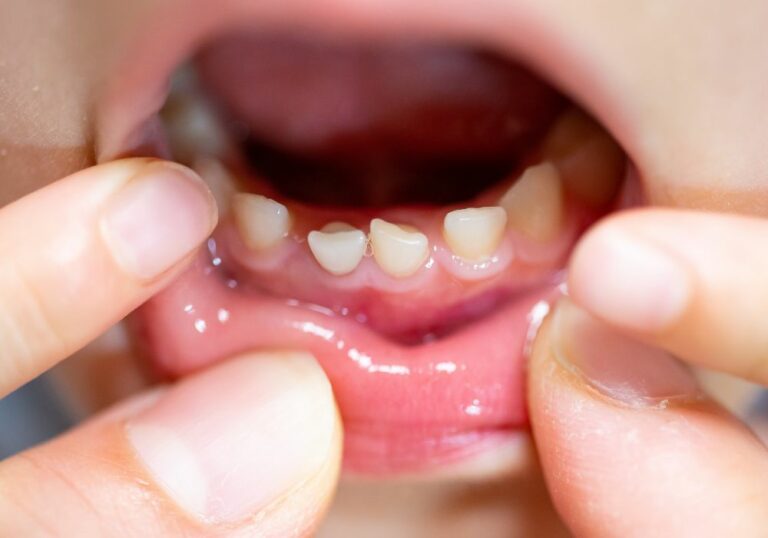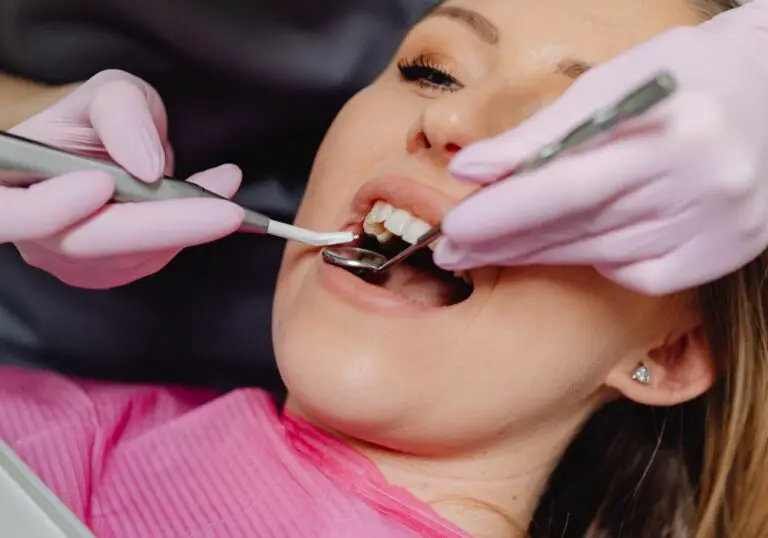Are you curious about what helps teeth grow in? Teeth play a crucial role in our daily lives, from enabling us to chew and speak properly to enhancing our appearance. However, not everyone is born with a full set of teeth, and some may experience tooth loss due to injury or decay. Luckily, there are ways to promote healthy tooth growth and replace missing teeth.
One of the most important factors in tooth growth is proper nutrition. Nutrient-dense foods such as meats, dairy products, leafy greens, and fresh fruits provide the building blocks for healthy teeth and bones. Calcium and phosphorus are especially important for tooth development, so be sure to include plenty of dairy products and leafy greens in your diet. Additionally, vitamin D helps your body absorb calcium, so make sure to get enough sunlight or take a vitamin D supplement if necessary.
Understanding Tooth Development

Tooth development is a complex process that begins during fetal development and continues throughout childhood. Understanding the stages of tooth growth and the genetic factors that influence it can help you take better care of your teeth.
Stages of Tooth Growth
Tooth growth occurs in several stages, beginning with the formation of tooth buds during fetal development. The following stages of tooth growth occur during childhood:
- Bud stage: At around 8 weeks in utero, dental epithelium cells bud from a thick band of cells called the dental lamina, which forms inside the upper and lower jaws. These cells will eventually form the tooth germ, which is made up of all the soft tissues necessary to grow a tooth.
- Cap stage: At around 20 weeks in utero, the tooth germ grows into a cap shape, with the enamel organ forming the outer layer of the cap and the dental papilla forming the inner layer.
- Bell stage: At around 28 weeks in utero, the tooth germ takes on a bell shape, with the enamel organ forming four distinct layers and the dental papilla differentiating into odontoblasts, which will eventually form dentin.
- Apposition stage: During this stage, the enamel organ and dental papilla begin to secrete enamel and dentin, respectively, which gradually form the tooth.
- Maturation stage: During this stage, the tooth completes its development, with the enamel and dentin hardening and the tooth root forming.
Genetic Factors
Genetic factors play a significant role in tooth development, influencing the size, shape, and number of teeth that an individual will have. For example, mutations in the genes that control tooth development can lead to conditions such as hypodontia (missing teeth) or hyperdontia (extra teeth).
In addition, genetic factors can influence the strength and health of teeth, making some individuals more prone to tooth decay or gum disease. However, good oral hygiene practices, such as brushing and flossing regularly and visiting the dentist for regular cleanings and checkups, can help maintain healthy teeth and prevent dental problems.
Nutrition and Teeth Growth
Proper nutrition is crucial for the growth and development of healthy teeth. Nutrients such as vitamins and minerals play a key role in the formation and maintenance of strong teeth. In this section, we will discuss two essential nutrients for teeth growth: Essential Vitamins and Calcium.
Essential Vitamins
Vitamins are essential for the growth and development of teeth. Vitamin D, for example, helps the body absorb calcium, which is necessary for strong teeth. Vitamin A is also important for tooth enamel, while vitamin C helps to strengthen gums and prevent gum disease.
Here are some foods that are rich in these essential vitamins:
| Vitamin | Food Sources |
|---|---|
| Vitamin D | Fatty fish, egg yolks, fortified milk and cereals |
| Vitamin A | Sweet potatoes, carrots, leafy greens, liver, and eggs |
| Vitamin C | Citrus fruits, strawberries, kiwi, bell peppers, and broccoli |
By incorporating these foods into your diet, you can help promote healthy teeth growth and development.
Importance of Calcium
Calcium is the most important mineral for teeth growth and development. It helps to build strong bones and teeth, and also plays a key role in maintaining healthy gums. Without enough calcium, teeth can become weak and prone to decay.
Here are some calcium-rich foods that you can include in your diet:
| Food | Calcium Content |
|---|---|
| Milk | 300 mg per cup |
| Cheese | 200-300 mg per ounce |
| Yogurt | 300 mg per cup |
| Leafy Greens | 100-250 mg per cup |
It’s important to note that calcium is best absorbed by the body when consumed with vitamin D. So, make sure to include foods rich in both nutrients in your diet.
By making sure to consume enough of these essential vitamins and minerals, you can help promote healthy teeth growth and development.
Oral Hygiene and Teeth Growth

Good oral hygiene is essential for healthy teeth and gums. It not only prevents tooth decay and gum disease but also promotes teeth growth. Here are some tips to help you maintain good oral hygiene and support teeth growth.
Brushing Habits
Brushing your teeth twice a day is crucial for maintaining healthy teeth and gums. Use a soft-bristled toothbrush and fluoride toothpaste to brush your teeth for at least two minutes. Make sure to brush all surfaces of your teeth, including the front, back, and chewing surfaces.
To promote teeth growth, focus on brushing the gum line. Gently brush the area where your teeth meet your gums in a circular motion. This helps to remove plaque and bacteria that can cause gum disease and impede teeth growth.
Flossing
Flossing is just as important as brushing when it comes to maintaining good oral hygiene and supporting teeth growth. Floss at least once a day to remove food particles and plaque from between your teeth and along the gum line.
To floss properly, wrap the floss around your fingers and gently slide it between your teeth. Curve the floss around each tooth and slide it up and down to remove any debris. Be sure to use a fresh section of floss for each tooth.
By practicing good oral hygiene habits, you can support teeth growth and maintain healthy teeth and gums. Remember to brush and floss regularly and schedule regular dental checkups to ensure optimal oral health.
Medical Conditions Affecting Tooth Growth
If you are experiencing delayed or absent tooth formation, it could be due to certain medical conditions. Here are two conditions that can affect tooth growth:
Hypodontia
Hypodontia is a condition where one or more teeth fail to develop. It is a genetic condition that affects both primary and permanent teeth. People with hypodontia may have gaps or spaces between their teeth, and their teeth may be smaller than usual. The most commonly affected teeth are the wisdom teeth, second premolars, and lateral incisors.
Hyperdontia
Hyperdontia is a condition where there are extra teeth in the mouth. It is also a genetic condition that affects both primary and permanent teeth. People with hyperdontia may have one or more extra teeth in their mouth, which can cause problems with tooth alignment and bite. The most commonly affected teeth are the incisors and molars.
If you suspect that you have hypodontia or hyperdontia, it is important to consult with a dentist or orthodontist. They can evaluate your teeth and provide treatment options to help improve your oral health.
In addition to these conditions, other medical conditions can affect tooth growth, including nutritional deficiencies, hormonal imbalances, and certain medications. If you are experiencing delayed or absent tooth formation, it is important to talk to your healthcare provider to determine the underlying cause and appropriate treatment options.
Preventive Measures for Healthy Teeth Growth

Taking preventive measures can help ensure healthy teeth growth and maintain good oral health. Here are some tips to follow:
Regular Dental Checkups
Regular dental checkups are essential for healthy teeth growth. It is recommended to visit your dentist every six months for a routine checkup and cleaning. During the visit, your dentist can detect any early signs of tooth decay, gum disease, or other dental problems.
Your dentist may also recommend dental treatments to prevent tooth decay, such as fluoride treatment or dental sealants. Fluoride treatment helps strengthen tooth enamel, while dental sealants act as a barrier to prevent bacteria from settling in the grooves of your teeth.
Avoiding Harmful Habits
Avoiding harmful habits is crucial for healthy teeth growth. Here are some habits to avoid:
- Sugary Foods and Drinks: Consuming sugary foods and drinks can increase the risk of tooth decay. Limit your intake of sugary foods and drinks, and brush your teeth after consuming them.
- Smoking: Smoking can cause gum disease, tooth loss, and other dental problems. Quitting smoking can improve your oral health and overall health.
- Grinding Teeth: Grinding your teeth can cause tooth damage and jaw pain. If you grind your teeth, talk to your dentist about a mouthguard to protect your teeth.
- Chewing Ice: Chewing ice can cause tooth damage and sensitivity. Avoid chewing ice to protect your teeth.
In conclusion, taking preventive measures and avoiding harmful habits can help ensure healthy teeth growth. Regular dental checkups and good oral hygiene practices are essential for maintaining good oral health.
Frequently Asked Questions
How do adult teeth grow?
Adult teeth grow in the same way as baby teeth. They start developing in the jawbone and then move up through the gums. However, adult teeth are larger and stronger than baby teeth, and they usually take longer to come in.
How do teeth grow for babies?
Baby teeth start developing before a baby is born and will normally start to come through when an infant is between 6 and 12 months old. The front teeth usually come in first, followed by the molars and canines. By the time a child is 3 years old, they should have a full set of 20 baby teeth.
How do teeth grow through gums?
Teeth grow through the gums when the root of the tooth pushes up through the jawbone and into the gum tissue. As the tooth moves up, it creates pressure on the gum tissue, which can cause discomfort and pain. Once the tooth has broken through the gum, it will continue to grow until it reaches its full size.
What triggers teeth to grow?
Teeth grow in response to hormones that are released by the body. These hormones stimulate the growth of cells in the jawbone, which then form the tooth. The process of tooth growth is complex and involves many different factors, including genetics, nutrition, and overall health.
How can I help my baby’s teeth come in?
You can help your baby’s teeth come in by providing them with a healthy diet that is rich in vitamins and minerals. You should also make sure that your baby gets plenty of rest and exercise, as these are important for overall health and development. Finally, you can help soothe your baby’s gums by giving them a teething toy to chew on.
How long does it take for a tooth to grow in?
The time it takes for a tooth to grow in can vary depending on the individual. Generally, baby teeth take between 6 and 12 months to come in, while adult teeth can take several years to fully develop. If you are concerned about your child’s tooth development, you should talk to your dentist.







